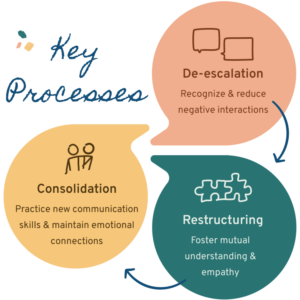What is Emotionally Focused Therapy (EFT)?

What is Emotionally Focused Therapy (EFT)?
Couples and families often face emotional challenges that can strain relationships, turning everyday stressors into potential sources of conflict. Emotionally Focused Therapy (EFT) is a therapeutic approach that addresses the emotional dynamics and bonds within relationships. Developed in the 1980s by Sue Johnson and Les Greenberg, EFT is rooted in attachment theory and focuses on the emotions and bonds between individuals.
Types of Emotionally Focused Therapy (EFT)
EFT can be applied to different types of relationships, including:
- Couples therapy: Focuses on improving communication, understanding emotional needs, and enhancing the bond between romantic partners.
- Family therapy: Extends EFT principles to family units, addressing relational dynamics and fostering secure attachments among family members.
- Individual therapy: Applies EFT techniques to help individuals explore their emotional experiences, understand attachment patterns, and develop healthier relational skills.
Key processes in Emotionally Focused Therapy
 De-escalation
De-escalation
De-escalation in EFT involves assisting individuals or couples in handling and decreasing conflict. Therapists guide clients through identifying triggers and emotional responses, teaching them to recognize and de-escalate negative interaction patterns. By understanding underlying emotions and needs, participants can learn to communicate more effectively and diffuse tension.
Restructuring
Restructuring focuses on reshaping the emotional bonds and interaction patterns within relationships. Through structured exercises and dialogue, individuals and couples explore deeper emotional experiences and vulnerabilities. Therapists help clients reframe negative perceptions and behaviors, fostering mutual understanding and empathy.
Consolidation
Consolidation is the final phase of EFT that focuses on solidifying new relational patterns and emotional bonds. Clients integrate insights gained during therapy into their daily lives, practicing new communication skills and maintaining emotional connections. Consolidation aims to reinforce positive changes and sustain healthier relationship dynamics over time.
Benefits of Emotionally Focused Therapy
Emotionally Focused Therapy (EFT) provides several benefits, including:
- Enhanced emotional connection: Improves intimacy and strengthens emotional bonds between partners or family members.
- Effective conflict resolution: Equips individuals with tools to address conflicts constructively and find mutual solutions.
- Improved communication skills: Enhances communication by promoting openness, empathy, and understanding.
- Greater relationship satisfaction: Leads to increased satisfaction and fulfillment within relationships.
- Emotional healing: Helps individuals and couples heal from past emotional wounds and develop secure attachment styles.
Ready to prioritize your relationship’s emotional health with EFT?
If you face challenges in your relationship or family, Emotionally Focused Therapy (EFT) can offer a supportive framework to explore emotions, enhance communication, and foster healthier connections. Great Lakes Psychology Group connects you to compassionate therapists who are prepared to help you navigate these transformative processes. To find an EFT-trained therapist in our network, use our therapist-finding tool at findmytherapist.com, filter your search by “Approaches” and select “Emotionally Focused Therapy” or “Emotionally Focused Couples Therapy.”
Ready to prioritize your mental health?
Great Lakes Psychology Group is here to help. With an extensive network of caring therapists available to meet online or in-person, we make it easy to find the right fit for your unique needs.



